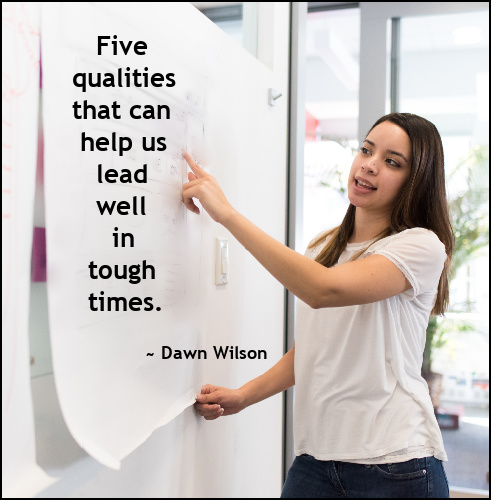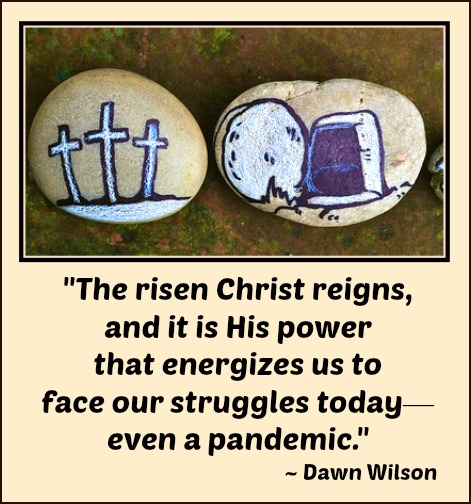Minister with 'Last-Days Leadership'
Many people are pointing to the "signs of the times" and concluding that Christians will soon meet their savior, Jesus, in the air (in the rapture of the Church). Whether that day is almost here, or many years away, we definitely are going to face troubling days ahead. In light of that, we need strong leaders. It's what I like to call "Last-Days Leadership." In this Leadership UPGRADE, I'll share five qualities that can help us lead well in tough times.
Jesus exemplified leadership as the perfect servant-leader. He trained a small team while drawing countless others to follow His message of light and life, forgiveness and freedom. (A good study might be to read the scriptures with this thought: "How can I lead like Jesus?")
There are as many kinds of leadership as there are roles in ministry. Also, as we lead, it's wise to be be a good follower / learner ourselves, asking, "How can I grow in my leadership skills?"
Here are five qualities that can help us lead well in tough times.
The Five C's of Last-Days Leadership
1. CONFIDENCE: Trust God in a Shaky World.
People are frazzled, fearful, and frustrated by the scary things happening in the world:
- the constant threat of nuclear disaster,
- the devaluating dollar,
- new diseases,
- unstable weather,
- strained and broken relationships,
- and stress like never before.
Christian leaders know that the only true source for the security and peace the world craves is God. Everything and everyone else can be taken from us or lost.
Have you heard this statement? "You just need to believe in yourself!" That and many other catchphrases from pop psychology and the culture-at-large can mislead Christians. It's okay to believe you have the ability to do this or that—when you actually DO have the ability—and we all need a measure of confidence to make choices or try new things.
But self-confidence is limited, and when our confidence is accompanied by hurtful pride and independence from God, it's sinful.
More than confidence in ourselves, we need God confidence!
When we need clear direction in a shaky world, the Lord of heaven is our help and resource. Proverbs 3:5-6 reminds us to trust in Him and not lean on our own understanding. Other scriptures also caution about human confidence (like Proverbs 28:26 and Jeremiah 9:23).
It is wise to acknowledge God's right to control our lives.
Rather than trying to drum up more confidence, act in faith every day, and teach others the wisdom and value of confidence in God too.
2. COMPASSION: Love People in a Needy World.
Effective ministry flows from personal interaction.
Leadership without genuine love and compassion will not help and change people; it will only keep “programs” going.
Jesus often met people’s physical needs before He dealt with their spiritual needs. Servant-leaders are wise to look at others through eyes of compassion and understanding. Offer your hands and heart to God.
If there are any problems in leadership, they usually come from the leader’s failure to connect with people in the group, so:
- take time to understand people’s needs and wishes,
- connect to needs by developing relationships,
- ask questions,
- and show sincere concern.
Compassion means “to suffer with”—sincere love that comes alongside others, as Jesus did (Matthew 9:36; 14:14).
If there are people in your group that you don’t know how to encourage or lead, take another look. See them through Jesus’ eyes!
Be aware of teachable moments that arise out of sacrificial ministry.
3. CONVICTION: Embrace Truth in a Confusing World.
Do you know what you believe, and why? Can you explain it to others?
As a Christian leader, you are responsible to guide others to the truth of God’s Word, and help them understand how His truth applies to their personal lives.
The Apostle Paul said, “I know whom [not just what] I have believed” (2 Timothy 1:12). That should be the confession of every child of God, especially Christian leaders.
Know God’s Word to know Him!
The world would like us to compromise what we believe—to water it down and tolerate lies—but it is only the truth that sets people free (John 8:32; 17:17).
The scriptures are profitable and powerful (2 Timothy 3:16; Hebrews 4:12). Embrace the Word, and seek the will of God daily. Your leadership will be rooted and fruitful (Psalm 1:1-3).
There is no substitute for the pure Word of God.
4. CHARACTER: Reflect Christ to a Watching World.
God chose each of us “to go and bear fruit—fruit that will last” (John 15:16). Ambassadors for Christ will serve Him with integrity and good character (2 Corinthians 5:20).
Leaders should model behavior they want co-laborers and followers to emulate, but even more is at stake: the world is watching to see if our walk lines up with our talk.
Reflect Christ. Bring glory to His name, not shame.
We want:
- to be holy because God is holy (I Peter 1:16),
- to discipline our lives in righteousness (I Corinthians 9:27),
- and to love others sincerely (without hypocrisy) so the world can see God in us (I Corinthians 13:4-8; Romans 12:9; I John 4:12).
People are watching—guard your heart and mind!
5. COURAGE: Stand for God in an Unbelieving World.
As our culture plunges deeper into sin, the light of holy Christians will shine brighter and brighter and people should see the difference (Matthew 5:16).
But that's not all that will happen.
- The world despises those who follow Christ with a whole heart and believe in the authority of the unchanging Word of God (John 15:18-19), so expect tension between good and evil.
- You may even be called to suffer for His sake as you stand for truth (Romans 8:17-18; 2 Timothy 3:12; I Peter 4:15-16).
How can you move forward in courage?
- Find strength in the joy of the Holy Spirit's presence (John 14:16-17). Jesus sent Him to be our helper and, especially when times get tough, He gives direction based in the truth.
- Cast a biblical vision of holiness in the fear of God, sacrificial service, and joyful ministry. Where there is no vision—no long-term plan based in the Word and will of God—people will either be destroyed or wander aimlessly. So help them see what God is doing (Proverbs 29:18 MSG).
- This is not a time to be fuzzy about our role as leaders! Stand alone, if necessary, for what is right. Be bold for God!
No matter where we are on the timetable of God, we still want to minister well. God can help us do that with confidence, compassion, conviction, character, and courage.
We don't need to worry about "success"—we only need to be faithful to what our Father in heaven has called us to do; and if he has called us to lead, let us do it to honor Him.
Are you a leader in some way? Are you practicing the five C's? If not, what can you do to improve?
Dawn Wilson, founder and President of Heart Choices Today, is a speaker and author,  and the creator the blog, Upgrade with Dawn. She is a contracted researcher/reviewer for women's teacher and revivalist, Nancy DeMoss Wolgemuth at Revive Our Hearts, and is a regular columnist at Crosswalk.com. She and her husband Bob live in sunny Southern California, and Dawn has traveled with Him in Pacesetter Global Outreach. They have two grown, married sons, three granddaughters and a rascally maltipoo, Roscoe.
and the creator the blog, Upgrade with Dawn. She is a contracted researcher/reviewer for women's teacher and revivalist, Nancy DeMoss Wolgemuth at Revive Our Hearts, and is a regular columnist at Crosswalk.com. She and her husband Bob live in sunny Southern California, and Dawn has traveled with Him in Pacesetter Global Outreach. They have two grown, married sons, three granddaughters and a rascally maltipoo, Roscoe.
Graphic adapted, courtesy of Christina at Wocintechchat.com for Unsplash.
 Post a Comment → Posted on
Post a Comment → Posted on  Wednesday, November 15, 2023 at 9:32PM
Wednesday, November 15, 2023 at 9:32PM  Character,
Character,  Compassion,
Compassion,  Confidence,
Confidence,  Conviction,
Conviction,  Courage,
Courage,  Dawn Wilson,
Dawn Wilson,  God-confidence,
God-confidence,  Last-days Leadership,
Last-days Leadership,  Leadership,
Leadership,  Upgrade with Dawn Upgrade Your Life
Upgrade with Dawn Upgrade Your Life  Leadership,
Leadership,  Ministry
Ministry 










